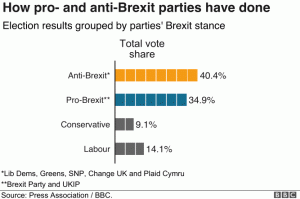 Views in the UK are polarised. It is difficult to draw any clear message from the pattern of voting in the European elections, but the graph – prepared by the BBC, seems to mark a strong shift against Brexit. You wouldn’t know it from the BBC’s Brexit coverage; I am listening now to a Radio Scotland item which is telling me that the Brexit Party romped home in the election. Clearly, they didn’t.
Views in the UK are polarised. It is difficult to draw any clear message from the pattern of voting in the European elections, but the graph – prepared by the BBC, seems to mark a strong shift against Brexit. You wouldn’t know it from the BBC’s Brexit coverage; I am listening now to a Radio Scotland item which is telling me that the Brexit Party romped home in the election. Clearly, they didn’t.
The denial of votes to EU citizens on election day is another national disgrace; it will be the subject of legal action. The assault on the rights of EU citizens goes rather beyond the 3.6 million people from the rest of Europe resident in the UK – or even them plus the 1.2 million UK residents in other European countries. UK citizens are European citizens, too. The formal census figures are out of date, as usual, but the population of the UK in 2017 was roughly 66 million, and 90% are British nationals. A further 5.6 million currently live abroad, of whom 1.2 million live in other EU countries. We should perhaps discount 1.9 million people from Northern Ireland, because their rights are guaranteed if they so wish it by the Irish government, but that still leaves us with 57.7 million British nationals in the UK, and 5.6 million outside the UK, whose rights to European citizenship are being withdrawn. In the 2016 referendum, 17.4 million people voted to leave the EU. If we assume that all of them can be said to have consented to the loss of their rights, that still leaves 46.9 million other British citizens who are being denied their fundamental rights on the basis of that vote, and more than 50 million people when we consider European citizens from other countries living in Britain.
Channel 4 News has used the BBC information or did its own similar analysis. IIRC, the same results were displayed.
The EU is not a sovereign nation (yet) – it is an undemocratic regime – so how can anybody be an EU citizen?
The EU is obviously not a ‘nation’ – but nor is the UK, which is a union of four nations. It does have a degree of ‘sovereignty’, in the conventional sense of being in itself a source of legitimacy. It has citizens both because there is an international treaty which says it does, and a system of laws in its own right which says so. You will find the Charter of Fundamental Rights of the European Union here, and the rights of European citizens laid out in title 5 of the charter.
I’d agree that the EU has a democratic deficit. If it didn’t, it couldn’t get away with cancelling the rights of citizens.